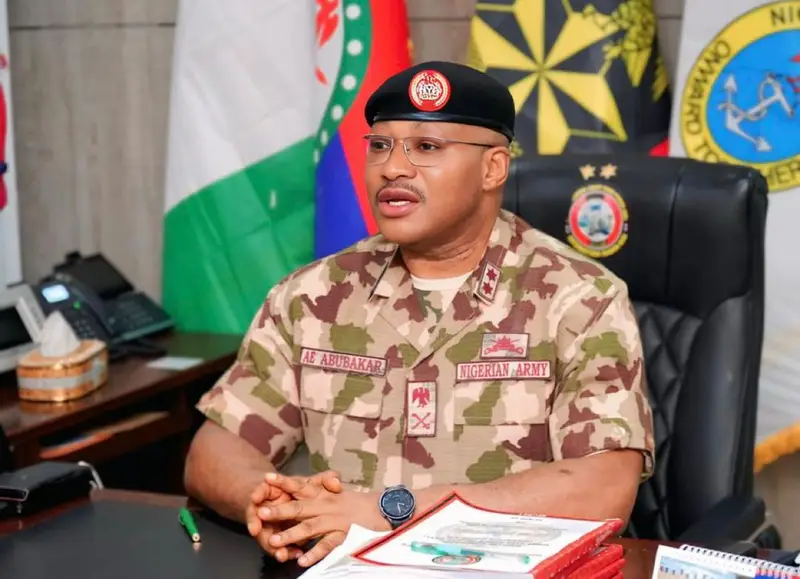Maj.-Gen. Abdulsalam Abubakar, Theatre Commander, Joint Task Force, North East Operation Hadin Kai (OPHK), says the security situation in the region has improved significantly following sustained counter-terrorism operations and renewed synergy among security agencies.
He said this in an interview with the News Agency of Nigeria (NAN) on Saturday in Maiduguri.
Abubakar said the Armed Forces of Nigeria (AFN) maintained the operational initiative across the theatre, denying terrorists the freedom of movement and access to logistics that once fuelled their campaigns of terror.
He said the lingering insecurity in the Northeast was not an isolated phenomenon but rather closely linked to broader regional and global developments, including instability in the Sahel, the Middle East, and the Russia–Ukraine war.
“Since November last year, we have observed an increase in the use of armed drones and radio-controlled Improvised Explosive Devices (IEDs) by the terrorists. These trends are direct consequences of global technological proliferation linked to conflicts elsewhere.
“However, our forces continue to retain the initiative. The goal of the armed forces remains to flush out the terrorists from their remaining strongholds in Sambisa Forest, the Mandara Mountains, the Tumbuns and the Lake Chad Islands (LCI),” he said.
Abubakar highlighted that coordinated operations aimed at achieving this strategic objective were yielding remarkable results.
He said, “In the last two months alone, about 26 key terrorist commanders have been neutralised, with substantial recoveries of arms, ammunition and vehicles. Many insurgent camps have been cleared and destroyed, forcing remnants of the groups into isolated pockets.
“Socio-economic activities have resumed in most areas previously under terrorist influence. Markets have reopened, schools are functioning, and roads that were once unsafe now experience daily movement of goods and people. That is a major milestone for us as a nation.”
The commander said sustained pressure by the Nigerian Army troops had restored confidence among the citizens, leading to increased voluntary returns to ancestral homes under the Borno State Government’s resettlement framework.
While highlighting some of the key achievements of the operations, Abubakar described the strangulation of the terrorists’ logistics strategy as a turning point in the fight against Boko Haram and ISWAP.
“By cutting off their supply chains, we have effectively crippled their capacity to sustain prolonged engagements. Several IED-making factories have been discovered and destroyed, and we have recorded tremendous successes in intercepting their logistics convoys,” he said.
Abubakar cited the July 2025 operation in Dikwa, where troops recovered over 50 lethal Improvised Explosive Devices (IEDs), as an example of how intelligence-led missions disrupted enemy capabilities.
He said the troops neutralised more than 257 terrorists in coordinated ground and air offensives, with many others surrendering along with their families between July and September, 2025.
“The terrorists’ employment of drones has also been curtailed through the deployment of advanced anti-drone technology and improved air dominance made possible by the unwavering support of the Military High Command.
“Recoveries of weapons have increased significantly, and our sustained offensive operations have continued to shrink the battle space for the terrorists,” he said.
Reacting to reports of renewed attacks in some border communities around Kirawa, Abubakar said the incidents were desperate attempts by the terrorists to create fear and attract attention.
“Most of these attacks are confined to remote border settlements, reflecting desperation rather than strength. Kirawa was previously under the security framework of the Multinational Joint Task Force (MNJTF), but we have now made adequate deployments to strengthen control and forestall further incursions,” Abubakar said.
To stem the attacks, Abubakar said the military command had deployed additional troops and logistics assets to the Kirawa axis, including quick response teams, armoured vehicles and surveillance units to ensure rapid response to any threat.
“OPHK covers about 130,000 square kilometres, so the terrain is vast. But we have improved our deployment posture and enhanced coordination with the MNJTF and local security volunteers to ensure that no area remains vulnerable. Kirawa is now fully secured with boots on the ground,” he assured.
Abubakar reiterated the commitment of the Armed Forces to achieve lasting peace in the region, stressing that the troops remain motivated and focused in their missions.
He urged the residents to continue cooperating with the military by providing credible intelligence as well as denying logistics support to the terrorists.
“Citizens must collaborate with the military in fishing out bad elements. This is a whole-of-society approach to asymmetric warfare. Denial of logistics and timely passage of information by communities remain crucial for our collective success.”
The commander also commended the gallantry of officers and men of the OPHK, who demonstrated courage, resilience and sacrifice in defence of the nation.
“Our troops are highly motivated and determined. The Northeast is steadily regaining its stability, and we remain fully committed to consolidating these gains until peace is completely restored,” the commander said.
Some of the community leaders in the affected areas commended the Nigerian military for its swift response and decisive actions to protect the citizens.
Alhaji Bukar Modu, a community elder in Gwoza, said the increased military presence in Kirawa and adjoining communities had restored public confidence.
“Before now, we used to hear gunshots almost every week. But since the troops came in numbers, the situation changed. We now sleep peacefully and even attend markets in Pulka and Gwoza without fear,” he said.
Also, Mrs Falmata Bakura, who recently returned from an Internally Displaced Persons (IDPs) camp in Maiduguri, described the soldiers’ conduct as professional and reassuring.
“Their presence alone gives us hope. We can see the soldiers patrolling day and night. Our children have resumed school, and we now farm without fear,” she said. (NAN)
The post North-East is more secure now – Army appeared first on Vanguard News.

